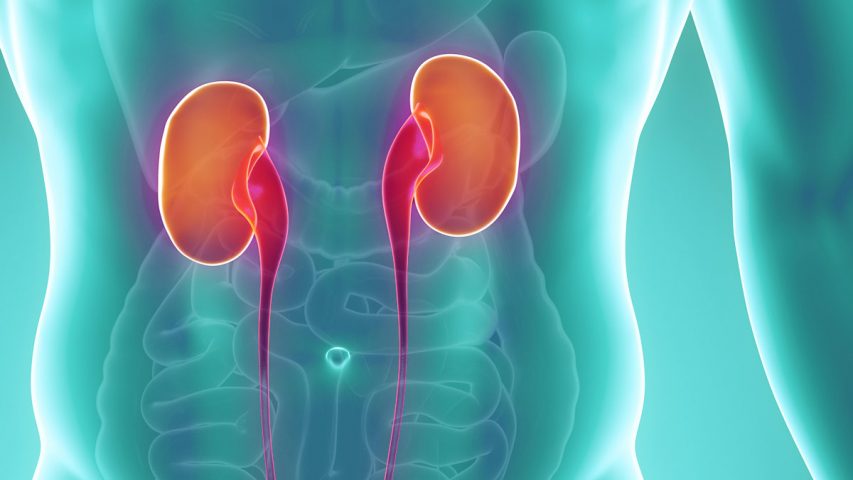- Have any questions? Contact us!
- info@dr-rath-foundation.org

Vitamin A Helps Control Tuberculosis
June 20, 2018
Study Finds 29 Types Of Pharma Drugs In British Rivers
June 22, 2018Chronic Kidney Disease And Its Natural Treatment

Chronic kidney disease (CKD) is a growing global health problem. A systematic review and meta-analysis published in 2016 assessed data on almost 7 million patients and found that all stages of this disease are associated with increased risks of cardiovascular morbidity, premature mortality, and/or decreased quality of life. With a high global prevalence of between 11 and 13 percent, CKD places a major economic burden on healthcare systems worldwide. While conventional drug-oriented medicine has failed to successfully prevent or treat it, numerous studies clearly show that micronutrient-based approaches to CKD are both safe and effective.
Symptoms
There are five stages of kidney damage. These range from very mild in stage 1, to end-stage kidney failure at stage 5. Kidney damage usually progresses slowly, so symptoms generally develop over time. Signs may include:
- Frequent nausea and vomiting
- Lack of appetite
- Weakness, shortness of breath
- Sleeping disorders
- Decreased mental abilities
- Muscle cramps
- Swelling of feet, legs, ankles, and sometimes face
- Frequent itching
- Chest pain
- High blood pressure (hypertension)
Symptoms of CKD are often nonspecific and can also be caused by other diseases. Often signs only occur when the kidneys are irreversibly damaged. The level of damage can be measured via kidney function tests, which examine levels of cellular waste products in the blood. Urine samples may also be analyzed, which can similarly reveal abnormalities.
| CKD can have a variety of different causes and contributory factors. Examples include: |
|
The Central American mystery
There is currently a mysterious epidemic of CKD in several Central American countries including El Salvador, Nicaragua, and Costa Rica. Present primarily in young male agricultural workers, especially those cutting sugar cane, recurrent dehydration as a result of working in very hot conditions has been cited as a possible cause. Use of nonsteroidal anti-inflammatory drugs (NSAIDs) and exposure to pesticides are among other suspected risk factors.
While researchers are still studying the epidemic, there is already little doubt that pesticides are implicated as a possible contributory factor. A study published in 2014 looked at patients suffering from CKD of unknown cause in India and found increased levels of organochlorine pesticides. A further study published in 2017 made similar findings, concluding there is an association between increased blood levels of certain organochlorine pesticides and the occurrence of CKD of unknown cause.
Conventional treatment
As with other chronic diseases, conventional medicine approaches to CKD only target its symptoms. Drugs for high blood pressure, such as angiotensin-converting enzyme (ACE) inhibitors or angiotensin receptor blockers, are often prescribed. Doctors may also give diuretic drugs to treat water retention, or statins to lower levels of cholesterol. However, these medications can cause severe side effects and do not address the root of the problem. Fortunately, therefore, as we shall see, there are other, safer options that can help.
 Do’s and don’ts
Do’s and don’ts
Your kidneys have to filter around half a cup of blood every minute, removing waste products and water to produce urine. They also assist in maintaining blood pH within normal limits (around 7.35 to 7.45). Eating a healthy diet and avoiding use of toxic pharmaceutical drugs can help prevent your blood becoming over acidic, a condition that is not favorable to kidney health.
Drink plenty of water! To help flush waste products from the body, your kidneys require between 2 and 3 liters of fluid daily. Coffee and alcohol are not helpful here as they are diuretics, meaning they cause the body to lose water. While you certainly can drink other beverages, ‘water’ is the watchword if you want to support kidney health.
Excess salt causes fluid retention and is counterproductive to kidney health. Small amounts are fine but try to avoid shaking additional salt on your food.
Natural treatment
Numerous studies show that a diet rich in vitamins, minerals, trace elements, amino acids, and essential fatty acids can help prevent and control CKD. The following micronutrients may be particularly beneficial:
| Vitamin D Emerging evidence suggests that the progression of CKD may be linked to vitamin D deficiency. |
| Selenium Research shows that low serum selenium levels are a frequent finding in patients with acute kidney injury or CKD. |
| Iron Research shows that iron deficiency is a major contributory cause to the development of anemia in CKD. Iron replacement therapy thus plays a critical role in its management. |
| Vitamin B6 Vitamin B6 status has been shown to be a significant factor in relation to inflammatory responses for CKD and hemodialysis patients. |
| Vitamin E In end-stage kidney disease patients undergoing hemodialysis, vitamin E has been shown to have significant beneficial effects. |
| Omega-3 Omega-3 fatty acid supplements have been shown to help reduce inflammation in CKD. |
| Antioxidants In diabetic kidney disease patients, research has shown that supplementation with antioxidants such as vitamin A, vitamin C, vitamin E, selenium, zinc, methionine or coenzyme Q10 may improve early renal damage. |
As always, if you have any questions about the natural treatment of chronic kidney disease, please feel free to contact us.



